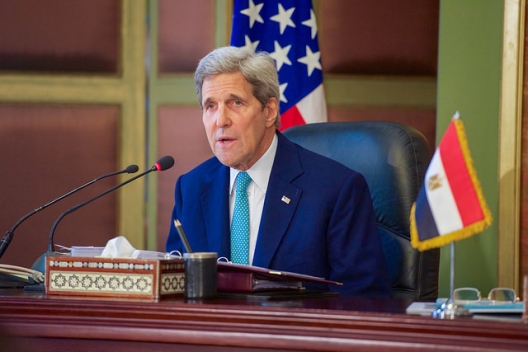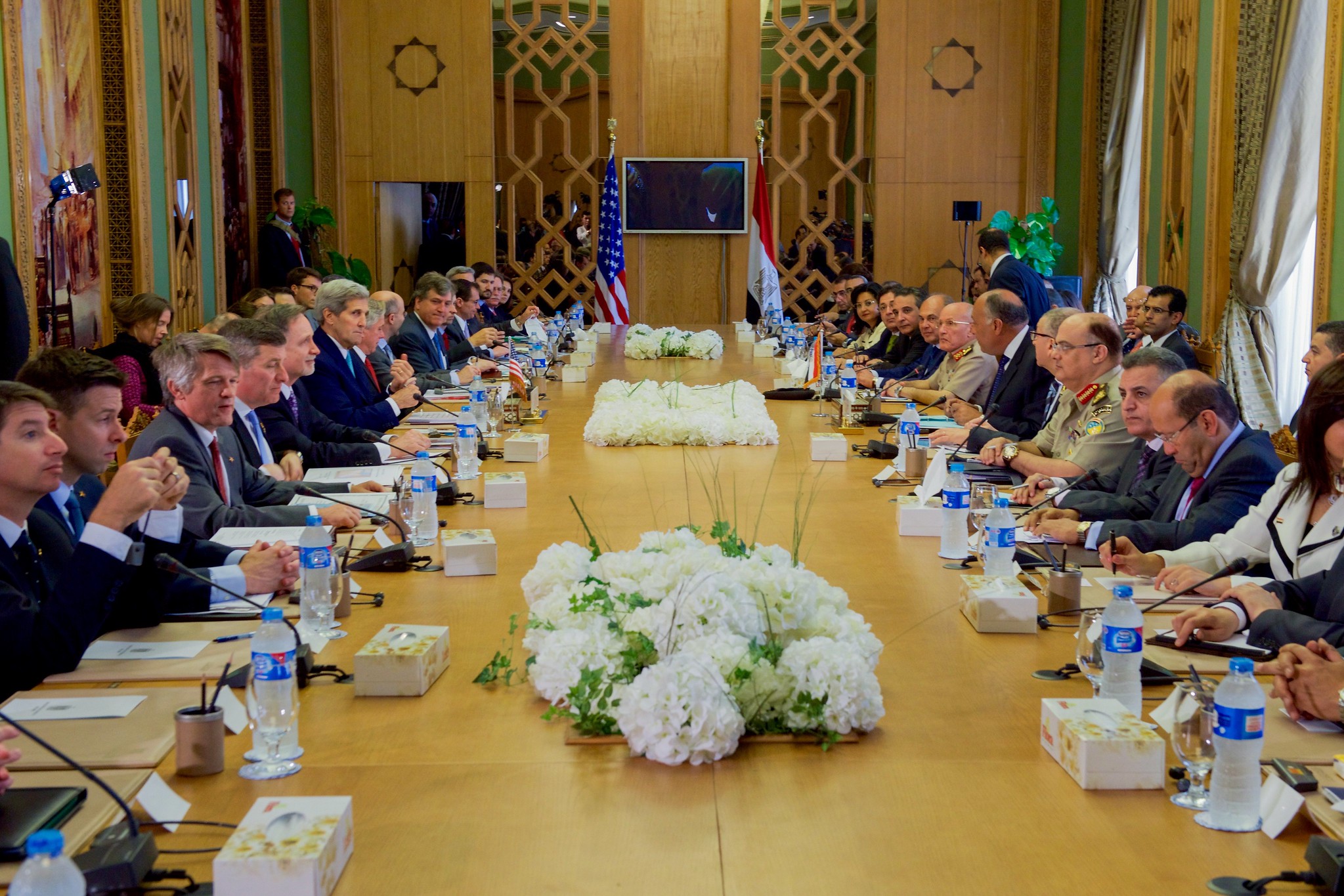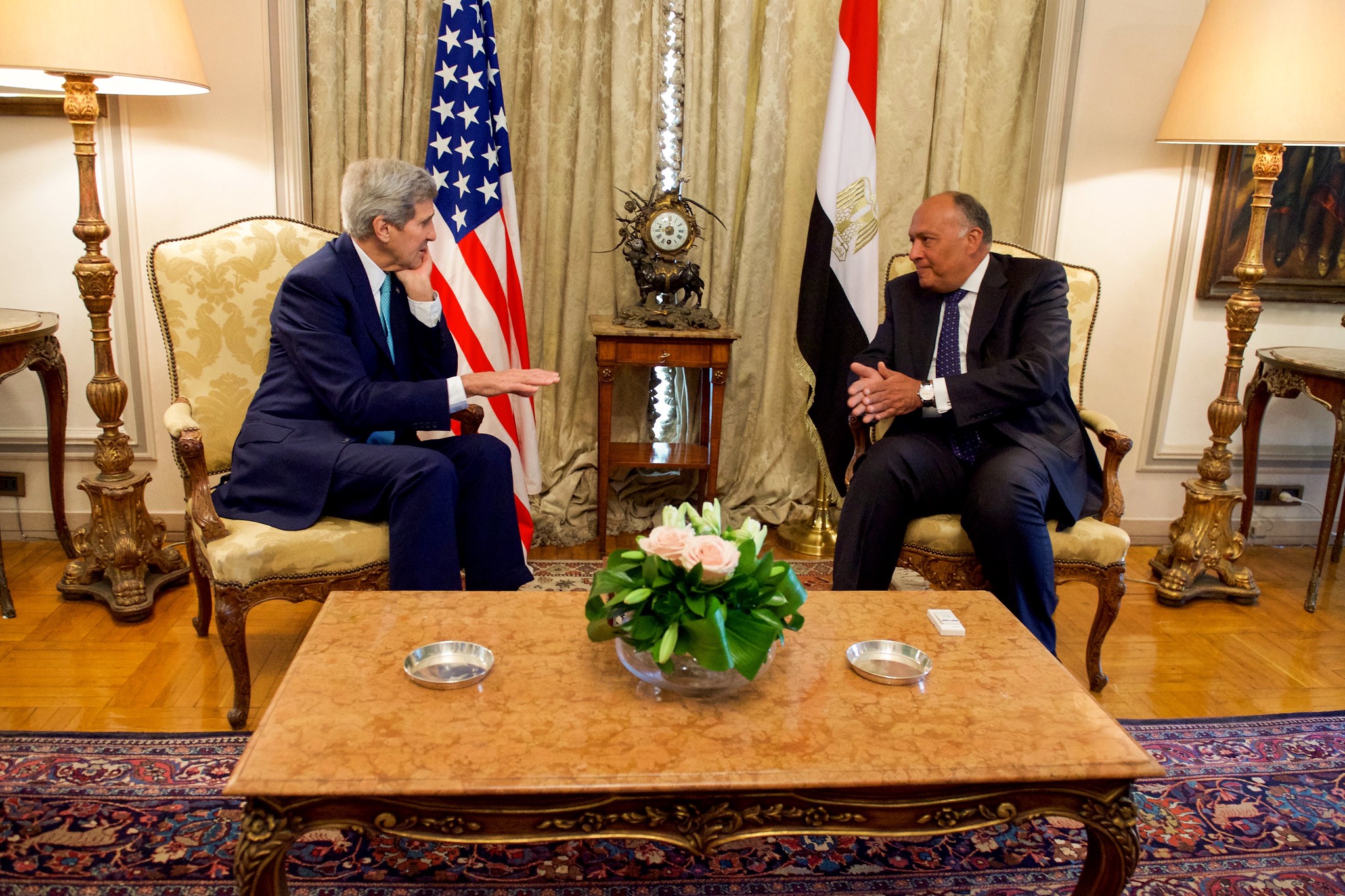 On August 2, US Secretary of State John Kerry sat down with Egyptian Foreign Minister Sameh Shoukry in the first US-Egypt Strategic Dialogue since 2009. Kerry discussed a number of issues with his Egyptian counterpart, including Egypt’s economy and the recent Iran nuclear deal. Kerry also met with President Abdel Fattah al-Sisi to discuss Egypt’s counterterrorism efforts. Originally scheduled to take place over two days, the dialogue was shortened to one day. While no official explanation was given for the adjustment, Ahram Online reported that the dialogue was shortened “due to last minute changes” and said that “observers” attributed the change to the dialogue’s focus on regional rather than bilateral issues.
On August 2, US Secretary of State John Kerry sat down with Egyptian Foreign Minister Sameh Shoukry in the first US-Egypt Strategic Dialogue since 2009. Kerry discussed a number of issues with his Egyptian counterpart, including Egypt’s economy and the recent Iran nuclear deal. Kerry also met with President Abdel Fattah al-Sisi to discuss Egypt’s counterterrorism efforts. Originally scheduled to take place over two days, the dialogue was shortened to one day. While no official explanation was given for the adjustment, Ahram Online reported that the dialogue was shortened “due to last minute changes” and said that “observers” attributed the change to the dialogue’s focus on regional rather than bilateral issues. 
Sec.@JohnKerry meets with Egyptian President Abdel Fattah al-Sisi after #strategicdialogue https://t.co/CAJOxnKBae pic.twitter.com/WIDjjMqvJj
— Department of State (@StateDept) August 2, 2015
President @AlsisiOfficial receives message from President @BarackObama at US-#Egypt Strategic Dialogue http://t.co/OC2GDlYDq7
— Embassy of Egypt USA (@EgyptEmbassyUSA) August 3, 2015
Sec @JohnKerry: the importance of the U.S.-Egypt relationship “cannot be overstated.” #strategicdoalogue pic.twitter.com/ZLQXJy3OMu
— US Embassy Cairo (@USEmbassyCairo) August 2, 2015
The visit came days after Kerry met with Egyptian-American Mohamed Soltan, who had been sentenced to life in prison in Egypt for financing an anti-government sit-in and spreading “false news,” before being deported back to the United States.
Remarks on the Bilateral Relationship
Ahead of Kerry’s visit, the State Department issued a statement saying the dialogue “reaffirms the United States’ longstanding and enduring partnership with Egypt.” The dialogue provides a “forum” to discuss political, economic, security, and cultural issues and promote “common values, goals and interests” between the two countries, the statement added.
Heading off tonight for #Egypt, #Qatar, #Singapore, #Malaysia, #Vietnam. Important work ahead, starting w/US-Egypt Strategic Dialogue.
— John Kerry (@JohnKerry) August 1, 2015
Prior to the dialogue, Egyptian Foreign Ministry Spokesman Badr Abdel Atty said the dialogue was aimed at “boosting the bilateral strategic partnership between Egypt and the [United States], especially after relations between Cairo and Washington became strained during the past two years.” The Egyptian Embassy in Washington, DC also issued a factsheet on the “dynamic” US-Egypt relationship.
In his remarks in Cairo, Kerry affirmed that “the American people are committed to the security and to the economic well-being of the Egyptian people, guided by the vibrancy of [Egypt’s] own civil society, [Egypt’s] politics, [Egypt’s] free and fair democratic process.” In a joint press conference, Kerry emphasized that “Egypt remains vital” for “engagement and stability in the region as a whole.”
A joint statement said the dialogue was based on “the shared belief that it is necessary to deepen the Egypt-US bilateral relationship,”in light of the countries’ “regional and international roles and the need to develop collective solutions to a wide range of complex issues.”
What Was Discussed?
Economy: On the economic front, Kerry stated that the United States welcomes “the steps that [Sisi] has taken to restore investor confidence, to stabilize finances,” and to improve the business climate. Kerry praised Sisi’s economic policies, including energy subsidy reforms, tax reforms, and a new investment law. Kerry said the United States is taking steps to help the Egyptian economy achieve double digit growth, such as by increasing foreign investment (Kerry noted that US firms have invested $2 billion in Egypt and are planning to do more), however he emphasized that sustainable reforms require “coverage and political will.”
Kerry outlined several issues the United States views as critical for Egypt’s economic recovery. First, he said the United States will work with Egypt to attract capital by providing technical help to the Egyptian Competition Authority and by renewing bilateral talks under the Trade and Investment Framework Agreement. Second, Kerry said the United States will work with Egypt to strengthen intellectual property safeguards. Third, Kerry underlined US-Egypt cooperation on empowering entrepreneurs and small and medium-sized businesses. Fourth, Kerry said the United States wants to work with Egypt to develop and implement a “comprehensive energy strategy.”
Kerry also congratulated Egypt on the upcoming opening of the new Suez Canal, which he called “a remarkable technological feat” that “will have a profound positive impact on global commerce and trade.”
Meetings were scheduled between the US delegation and representatives from the Egyptian private sector in the Egyptian-US Chamber of Commerce, however they were canceled when the dialogue was cut to a single day. “Meetings will be held between businessmen from both sides, but not as part of the official dialogue,” an official source told Ahram Online.
Special Rep 4 Commercial&Business Affairs Scott Nathan joins @amcham_egypt for #strategicdialogue readout @EconEngage pic.twitter.com/bQQGCBFM27
— US Embassy Cairo (@USEmbassyCairo) August 3, 2015
Extremism, counterterrorism, and military cooperation: A central topic at the dialogue was terrorism and extremism in Egypt, and the government’s counterterrorism efforts.
Kerry acknowledged the “high price” Egypt has paid in its fight against terrorism, remarking on the assassination of Prosecutor General Hisham Barakat, the bombing of the Italian Consulate in Cairo, and recent attacks in the Sinai. He expressed appreciation for Egypt’s support of the anti-ISIS coalition and Egypt’s “continued cooperation expediting [US] military overflights and access to the Suez Canal.”
Kerry announced several steps the United States will take in its military cooperation with Egypt. Kerry emphasized the US delivery of F-16s, Apache helicopters, Fast Missile Craft, armored vehicles, and other weapons systems to Egypt. Acknowledging US “commitment to Egypt’s security and [the] common fight against violent extremism and terrorism, “ Kerry said the US will continue to provide “robust training” to Egypt’s military, resume the “Bright Star” joint military exercise, and expand cooperation on border security and counterterrorism.
Notably, during the joint press conference, Kerry emphasized that the “fight against terrorism depends on building trust between the authorities and the public.” He said, “If that possibility does not exist, then, regrettably, more misguided people will be driven to violence and there will be more attacks.” He added that while “terrorists who kill civilians and attack Egyptian security forces have to be brought to justice,” it is just as important to “distinguish between those who use violence to achieve their ends and others who seek peacefully to participate in a political dialogue, even if what they say sometimes may make people uncomfortable.”
A statement by Egypt’s State Information Service said Shoukry and Kerry discussed coordination on Syria, Iraq, Libya, and Yemen, and that they agreed on “boosting bilateral cooperation especially in the security field and fighting terrorism and extremism.” Daily News Egypt reported that Sisi “welcomed President Obama’s desire to cooperate with Egypt to put a stop to the rise of militancy in the region,” while Shoukry emphasized the importance of US-Egypt military ties to regional stability.
Human Rights: Kerry said the United States has been “crystal clear” with Egypt about the US belief in human rights, including the right of assembly and the right of free speech. He said he and Shoukry discussed “the need for comprehensive reform in the police sector, protection for nongovernmental organizations, for press freedom, and for safeguarding the rights and freedoms of all Egyptians.” He said that the United States is “confident that Egypt has really good reason to ensure that the fundamental rights of its citizens are protected, that vital principles such as due process and freedom of press and association are cherished, and that women are empowered, and that every Egyptian has the right to participate peacefully within a truly democratic political process.”
In the joint press conference with Kerry, Shoukry pushed back against criticism of Egypt’s human rights record. In response to a question referencing a report by the Committee to Protect Journalists, which states that eighteen journalists are facing charges–two of whom were released on bail–Shoukry said that none of the journalists are in prison “or facing a judicial process related to their professional journalism.” He said they are accused of “implication with terrorist activity” and that they are “all in the state of due process by a judicial competent authority and are afforded all forms of defense.” Discussing Egypt’s controversial demonstration law, he reiterated the right of any country “ to regulate the issue of the demonstrations as it deems appropriate to preserving the stability and security of its people.”
Speaking on the issue of detention, Kerry added that he and Shoukry “openly” discussed “the problem of radicalization that can take place through imprisonment, through incarceration,” and the need for the rule of law to prevent young people from being pushed towards radicalization.
Shoukry also said there is “recourse to legislative reform” that could relieve pressure on the judicial system regarding “how it addresses issues of multiple rulings and the accused’s ability and recourse, especially when in absentia.” Notably, on Sunday, the Egyptian cabinet approved an amendment to the criminal procedure law that would allow defendants tried in absentia to be considered present if a lawyer represents them.
Elections: Kerry said he and Shoukry “agreed on the importance of ensuring free and fair and transparent parliamentary elections in Egypt this year.” He said he was impressed by the “deep commitment in Egypt” to hold the elections, which are “part of the roadmap towards democracy.” He added that Shoukry assured him that the elections “will be open to all peaceful political actors.”
When asked about the Egyptian government’s decision to outlaw the Muslim Brotherhood’s Freedom and Justice Party, Kerry offered a cryptic response, saying, “Do I think there are things they could do further? Yes. Have we laid them out? Yes.”
However, the Wall Street Journal reported that at the joint briefing with Kerry, Shoukry asserted that “the MBs [Muslim Brotherhood] are the fountain of all these radical and extremist ideologies.”
Iran nuclear deal: Kerry said he and Shoukry reviewed the Iran nuclear deal, and expressed gratitude for “Egypt’s commitment to the Non-Proliferation Treaty and also to the full implementation of this agreement.” Kerry said, “There can be absolutely no question that the Vienna plan, if implemented, will make Egypt and all the countries of this region safer than they otherwise would be.” The statement by the Egyptian State Information Service said Shoukry and Kerry “called for a comprehensive implementation” of the nuclear deal.
Human Rights Statements
Ahead of the dialogue, several letters high-level letters were sent to Kerry urging him to raise the issue of human rights during his meeting with Sisi. A bipartisan group of six senators sent Kerry a letter urging him to “make political reform, human rights, and fundamental freedoms” a central part of the agenda. The senators expressed concern that Egypt “is not on a path to long-term sustainable security of political inclusion.” They also voiced concern that recent US policy decisions, such as the resumption of military aid to Egypt, “have been interpreted by the Egyptian government as endorsement of the current political climate.” The said they “firmly believe that there can be no sustainable security or economic growth in Egypt without a serious reform effort.”
While the Senators outlined points of concern regarding the political climate in Egypt, they also praised Egypt for continuing to adhere to the peace treaty with Israel, securing the border with Gaza, and providing “military privileges” to the United States even as the country “continues to face serious terrorist threats.” Therefore, the Senators said the United States should continue to support Egypt, and they welcomed the Obama administration’s recent decision to channel US security assistance into four categories (counterterrorism, border security, Sinai security, and maritime security.) The signatories include Senator Ben Cardin of Maryland, the ranking Democrat on the Foreign Relations Committee, and Senators Marco Rubio, and John McCain.
The Working Group on Egypt, a bipartisan group of foreign policy experts formed in 2010 to promote greater US policy attention to Egypt, also sent a letter to Kerry urging him to use the dialogue as an opportunity to “press the Government of Egypt to end its campaign of indiscriminate repression in order to advance a more effective strategy for countering violent extremism.” The working group voiced concern for both state violence against demonstrators and political prisoners and violence carried out by militants in both small and large-scale attacks.
Foreign Ministry spokesman Atty rejected the letter, saying criticisms of Egypt’s human rights record “will not be taken into consideration as long as they are not official statements.” Calling the dialogue a “fresh start” with the United States, Atty said that the only thing Egypt cares about is that Obama and Kerry state the importance of strengthening US-Egypt ties and act accordingly.
Human Rights Watch (HRW) expressed similar concerns in a letter to Kerry, urging him to address human rights violations, political reform, and Egypt’s counterterrorism strategy in the Sinai. HRW also voiced worry that the resumption of military aid “appears to be an endorsement of Egypt’s policy of muzzling independent voices and squeezing political space.” The letter underlined a number of issues of concern, including widespread detention in Egypt and the crackdown on civil society and nongovernmental organizations.
Future of the Dialogue
In their joint statement on the dialogue, the United States and Egypt agreed to hold the next Strategic Dialogue in Washington, DC in 2016.
Elissa Miller is a Program Assistant at the Rafik Hariri Center for the Middle East at the Atlantic Council.
Image: Photo: US Secretary of State John Kerry addresses reporters during a news conference with Egyptian Foreign Minister Sameh Shoukry following a series of security and economic meetings during a Strategic Dialogue between the United States and Egypt in Cairo, Egypt, on August 2, 2015. (State Department photo/ Public Domain)

